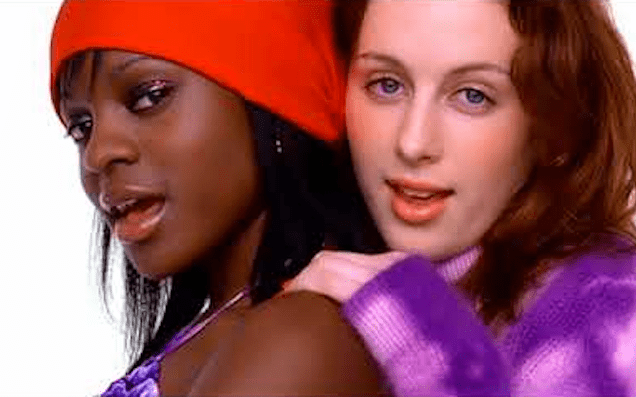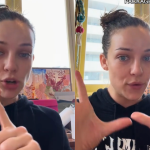
Oftentimes when someone says that they don’t like a song or an artist or whatever, they’re really saying that they actively dislike that particular song or artist or whatever. When I say that I don’t like Sugababes, I mean exactly that: there is no distaste for them, just an absence of like. Their music falls upon my ears like a light breeze over the disinterested earholes (?) of a seagull. I’m sure a lot of craft goes into writing and making those songs but they hit like an imperceptible geological hum — they just don’t stir anything in me. When I hear Push the Button or Round Round, I am not compelled to dance, cry, fuck, or engage an ancient dragon in wizard combat, wielding a demonic sword that is shaped like a bong (these are, of course, all four ways that you can be moved by music).
This is true of all of Sugababes’ music — from the band’s original line-up all the way through to their return to the original line-up — with one exception: the first track from their first album, the band’s very first single, Overload. If you need to reacquaint yourself with this stone-cold classic (weird that you would), please take the time to do so now:
Before I talk about why this song whips sack, let’s eyeball our context.
It’s September of 2000, a different time. The iconically indestructible Nokia 3310 is fresh on the market, people still think the internet is a net good, and you’re allowed to take nail files through airport security. Creed has more than one song in the top 20 spots on the Billboard charts. Aaron Carter is soaring upwards with soft rap nightmare Aaron’s Party (Come Get It), although he is still well behind 3 Doors Down and Matchbox Twenty. As those who lived through it will tell you, times were rough. From the clogged u-bend of that sonic toilet emerged Overload, splashing out onto the tiled bathroom floor of commercial radio.
The first thing you’ll notice about Overload is that bassline. Driving, repetitive, and with an intangible air of being somewhat lo-fi, like a jazz bassline sampled for a hip-hop beat. Rotate some 3D objects in your mind a bit and you will realise it is, in fact, a repurposed section of the bass from the mainstay song of every single movie in which any character takes any drugs: Jefferson Airplane’s White Rabbit. Combined with the drums and the laconic, lethargic vocals in the verse, the overall impression is Portishead-style trip-hop if, instead of being made by someone who had experienced 1000 years of heartbreak, it was being made by someone who had only experienced about 1 to 2 weeks of it.
Like most pop music the lyrics are vague, bordering on incomprehensible. What does “time does come true” even mean? Do you really, really not know the train’s destination if you also understand that it’s a one-way ticket to a madman’s situation? If you are still at the age where you are “skipping school,” how many “strange feeling[s]” can you have not “felt for years”? All feelings are new to you, you are a child.
They might be substanceless and broadly applicable with the same tactical blandness as a daily horoscope, but the lines are delivered with the sort of flat, terrifying coolness that high school girls seem to master almost instantly and wield to terrifying effect.
With the mood established, the second half is where the song takes off. The second chorus finishes and some gratuitous, extremely of-the-time record scratches throw us headfirst into a blistering, surf-mariachi guitar solo that wah-pedals into a fake ending, before coming back for a second round — the classic 1-2 punch.
Before we’ve even had a chance to comprehend what just happened to us and how, we’re spat out of the guitar solo into a vocal solo cast over a lumbering, half-time play on the verse. Again barely given a chance to acclimatise to our new surroundings, an air raid siren announces that our time here has ended and that we must return to the chorus, this time with all-new backing harmonies and punchy call and response vocals you will find yourself doing absent-mindedly, alone in your car.
In a time when pop music was either infuriating white teens rapping about pool parties or songs about break-ups performed by imitation garage rock bands that formed with the sole purpose of one day being used in a Just Jeans commercial, Sugababes gave us something moody, unconventional, and timeless. With three entire years to go before Britney Spears would invent and subsequently master pop music forever with Toxic, Overload was well before its time — a pearl (banger) cast before swine (people in the 2000s).



